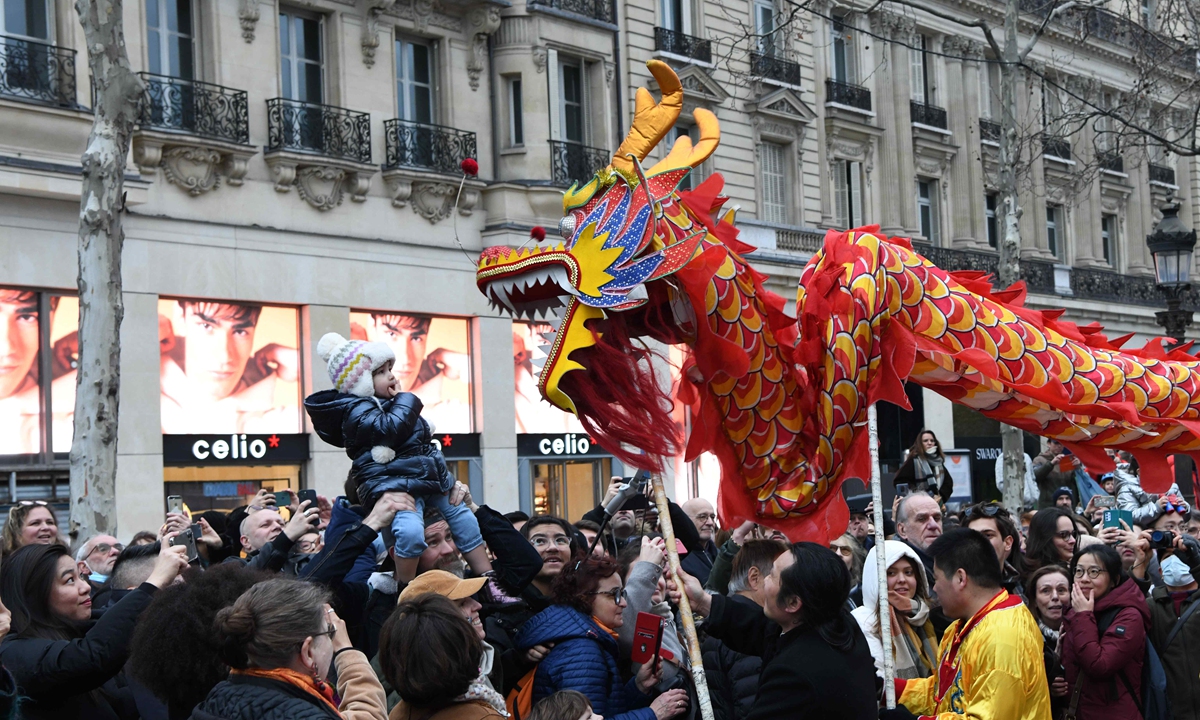As the Chinese Lunar New Year is just around the corner, the strong atmosphere of the Year of the Dragon is already palpable not only throughout China but also across the world, which is also the first Spring Festival since the UN listed the Chinese Lunar New Year as its floating holiday in its calendar of conferences and meetings.
With Chinese dragon-themed products selling rapidly overseas, there is also a growing interest among foreigners in discussing the Chinese zodiac signs, which could further promote Chinese culture globally, experts said. And in a complex international political environment, such cultural exchanges help foreigners gain a better understanding of the Chinese culture and China as a whole.
Global celebrations
Some major sites in Moscow are forming a special pedestrian route to celebrate the Chinese Lunar New Year, which will also be the first year that Moscow celebrates this festival, according to local media. Cultural activities such as a concert of Chinese folk music will also take place, as the Year of the Dragon also coincides with the 2024-2025 China-Russia Years of Culture, some Russian media reported recently.
In the US, the Asian American population has doubled in the first two decades of the millennium—and this year, cities across the country are preparing some of the most elaborate Chinese Lunar New Year festivities yet, travel magazine Condé Nast Traveler reported on January 29, listing “eight American cities that are going all out for [Chinese] Lunar New Year.”
From ornate decorations coloring casinos in Las Vegas to lively parades with lion dancers from New York City to San Francisco—and even an iconic celebration at Disneyland Resort in Anaheim, California—American cities are celebrating Chinese Lunar New Year by decking themselves out in fortuitous red hues and indulging in auspicious foods, like dumplings, whose gold ingot shapes are said to usher in prosperity, the media report said.
In Chinese culture, the upcoming lunar year will be the Year of the Dragon, and the dragon symbolizes bravery, progress, boundless vitality, and auspiciousness, conveying optimistic aspirations for the future, President Xi Jinping said during a recent visit to North China’s Tianjin. He encouraged the residents to embrace the new year with confidence and strive toward an even better life.
Chinese Ambassador to the US Xie Feng also extended Chinese Lunar New Year greetings to overseas Chinese, Chinese students and employees of Chinese institutions in the US on Sunday, saying that the dragon symbolizes auspiciousness, prosperity, and strength.
“We hope that China-US relations, in accordance with the principles of mutual respect, peaceful coexistence, and win-win cooperation proposed by President Xi, will continue on the right course and prosper steadily,” Xie said, who also wished “every ‘descendant of the dragon’ a smooth and prosperous year.”
Pope Francis extended his greetings to those celebrating the Chinese Lunar New Year, the Vatican News reported on Sunday, expressing “the hope that this feast may be an occasion to experience relationships of affection and gestures of care, which contribute to creating a society of solidarity and fraternity, where each person is recognized and welcomed in his or her inalienable dignity.”
“The overseas Chinese community has grown significantly in size, contributing to the increasing global influence of Chinese culture. Amid the diversity of cultures worldwide, the Spring Festival holds a prominent position,” Zhang Yiwu, a professor of cultural studies at Peking University, told the Global Times on Monday.
The Spring Festival also holds universal significance as it represents a celebration of spring and carries symbolic meaning, he said, noting that this is especially true for countries in the northern hemisphere. “The internationalization of the Spring Festival is a reflection of China’s growing influence on a global scale,” Zhang said.
Cultural exchanges
A woman surnamed Cai, who is currently studying in Kuala Lumpur, Malaysia, told the Global Times on Monday that local lion and dragon dance performances have been going on for several days. There are also large-scale shopping exhibitions for buying Chinese Lunar New Year goods, and supermarkets and malls in Kuala Lumpur are filled with decorations featuring the dragon. “When I walk into the shopping malls these days, I feel like I’m not abroad,” Cai said.
She added that the Chinese Lunar New Year festive atmosphere in Malaysia is very strong, and the local Chinese people have a particularly good inheritance of Chinese traditional culture, as well as a sense of cultural pride. “When the lion dance performance reaches an exciting point, everyone will cheer and applaud loudly, creating a particularly warm and joyful atmosphere,” she said.
According to data from AliExpress, Chinese Lunar New Year-themed products like Chinese Lunar New Year mystery boxes from Chinese trend brands and items featuring Chinese dragon elements such as red envelopes, paper-cut window decorations, lanterns, Chinese knots, and couplets have been selling in over 100 countries abroad, with the sales volume increasing by 2.6 times compared to the previous year.
Among them, sales of Chinese dragon-themed toys have seen a 50-fold increase. Consumers in the US, Spain, and South Korea show a particular liking for Chinese dragon toys, with approximately 40 percent of them being sold in these countries. Moreover, more than half of the red envelopes featuring the Year of the Dragon elements have been purchased by consumers in the US, the UK and France.
At the 2024 New Year reception for foreign journalists in China held by the Chinese Foreign Ministry in Beijing on Friday, the Global Times reporters saw the venue filled with mascots symbolizing the Year of the Dragon, along with some dragon-themed hats. In addition, there was a calligraphy performance that attracted the attention of many foreign journalists.
During the reception, Assistant Foreign Minister Hua Chunying complimented the foreign journalists wearing dragon hats, saying that such decorations were very cute, and she hoped that they would tell the Chinese stories well.
In the past, dragons were often seen as symbols of ferocity and aggression in the eyes of Westerners, and not necessarily associated with auspiciousness. However, as Western understanding of Chinese culture grows, they will also come to appreciate the significance of the dragon as a cultural symbol, Zhang noted.
“Especially in China’s cultural promotion efforts, the dragon has actually been transformed into a cute and auspicious image. In the realm of popular culture and creative products, it has been given an adorable makeover, retaining a positive and meaningful essence within it,” he said.
In order to promote cultural exchanges between China and the Western world, especially in boosting understanding of Chinese culture, some experts suggested that emphasis should be placed on symbols of traditional Chinese culture, such as pandas and dragons, which are internationally recognized cultural idols, highlighting the Chinese attributes and global recognition of these symbols.
“We should also look toward the future, targeting the younger generation and using emerging media methods such as gaming and short videos [to help cultural exchanges] not only on a global scale but also focusing on regions beyond English-speaking countries, including Southeast Asia,” Sun Jiashan, an associate researcher at the Central Academy of Culture and Tourism Administration, told the Global Times on Monday.













